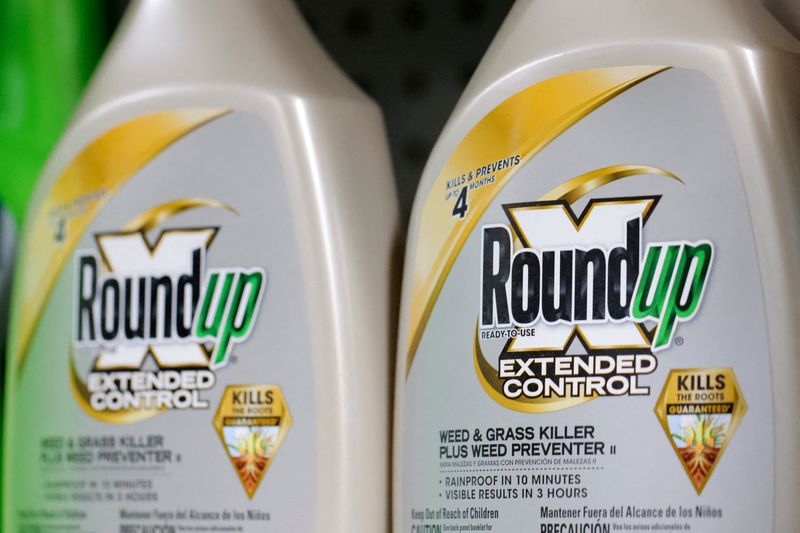By Brendan Pierson
(Reuters) - Despite more than $4 billion in U.S. jury verdicts over Bayer (ETR:BAYGN)'s Roundup weedkiller, including a $2.25 billion verdict last week, the company so far has shown no willingness to settle, instead betting that it can greatly reduce, or wipe out, its liability through legal appeals.
The strategy means the German pharmaceutical and biotechnology company could face further trials and hefty verdicts for years to come as its appeals work their way through U.S. courts. At least 10 trials are expected this year in state courts around the United States, and close to 50,000 Roundup lawsuits are currently pending.
Plaintiffs suing Bayer have said they developed non-Hodgkin's lymphoma and other forms of cancer due to using Roundup, either at home or on the job. Bayer denies those claims, and maintains the product is safe.
The long-running litigation has led some investors to call for a change of course, which could include restarting settlement talks or breaking up its business. Bayer shares have lost 70% of their value since the company inherited the lawsuits through its acquisition of U.S. agrochemical company Monsanto (NYSE:MON) for $63 billion in 2018.
"Mass tort litigation like the Roundup cases takes time before the outcomes are clear," Bayer said in a statement to Reuters. "The company will continue to try cases based on the extensive body of science and regulatory scientific assessments worldwide that support the safety and non-carcinogenicity of Roundup."
The World Health Organization's cancer research agency concluded in 2015 that glyphosate, Roundup's active ingredient, was likely capable of causing cancer, though it did not reach a conclusion about whether it posed a risk in real world use. U.S. and European regulators have found that glyphosate likely does not cause cancer and allowed its continued sale.
SHIFTING FORTUNES
Last September, Bayer was touting its ninth consecutive victory in Roundup trials. Its fortunes shifted in October, when plaintiffs started racking up victories of their own in California, Missouri and Pennsylvania state courts.
Most recently, a jury last Friday awarded $2.25 billion to Pennsylvania resident John McKivison, the largest Roundup verdict so far. Shares of Bayer, which has set aside $6 billion to cover Roundup liability, slumped more than 5% on the news.
In response to the trial losses, Bayer has vowed to appeal and expressed confidence that it will ultimately prevail. It has touted previous successes in appeals, pointing to three cases that went to trial before 2020 in which it managed to get verdicts totaling more than $1.4 billion knocked down to $132 million - a reduction of nearly 95%.
Most of that reduction resulted from U.S. Supreme Court guidance that punitive damages awards generally should not be more than nine times compensatory damages.
Bayer will be able to use that argument in some of the recent verdicts, too - though likely not in the McKivison case in which the jury awarded $250 million in compensatory damages and $2 billion in punitive damages, a factor of eight. It may still argue that the award was excessive for other reasons.
The company also has said that judges in recent trials have allowed expert witnesses presented by plaintiffs to misrepresent the science on the subject, an argument it is likely to make on appeal in an effort to overturn verdicts.
Finally, the company for years has been pursuing another legal argument that could limit its liability: that the approval of Roundup's label by federal regulators years ago means it cannot be sued for failing to warn consumers of alleged cancer risk.
Bayer has tried to get that argument before the conservative-majority U.S. Supreme Court, but so far, it has been rebuffed. Still, two pending appellate cases could open the door again, and Bayer has said it believes a Supreme Court victory on the issue would wipe out most of the Roundup litigation.
What all of Bayer's strategies have in common is that they will take years, and none is guaranteed to succeed. It could be a year or more before the Supreme Court hears any case, and if Bayer hopes to win at the state level, it would need to do so separately in each state's highest court, after making its way through mid-level appellate courts.
"It's almost naturally a bet-the-company posture," said David Noll, a Rutgers Law School professor who studies mass torts. "The litigation is in this strange holding pattern where Bayer is confident that it will eventually win on the science and knock out the entire litigation, but in the meantime, it's getting clobbered with verdicts."
At the same time, it is not clear how easily Bayer could settle the litigation overall - though it has settled some individual cases before trial.
In 2020, it agreed to pay $10.9 billion to resolve most then-pending Roundup lawsuits, but in 2021 a court rejected approval for a $2 billion plan to settle future cases.

In the wake of that rejection, Bayer began withdrawing Roundup from the home consumer market that year, though it is still sold for professional and agricultural uses. Bayer still could face new lawsuits from people who developed cancer years after exposure, or who used the product professionally, like farmers or landscapers.
Even after a settlement, new plaintiffs could be "knocking on Bayer's door again in one to two years' time," fund manager Markus Manns of Union Investment said.